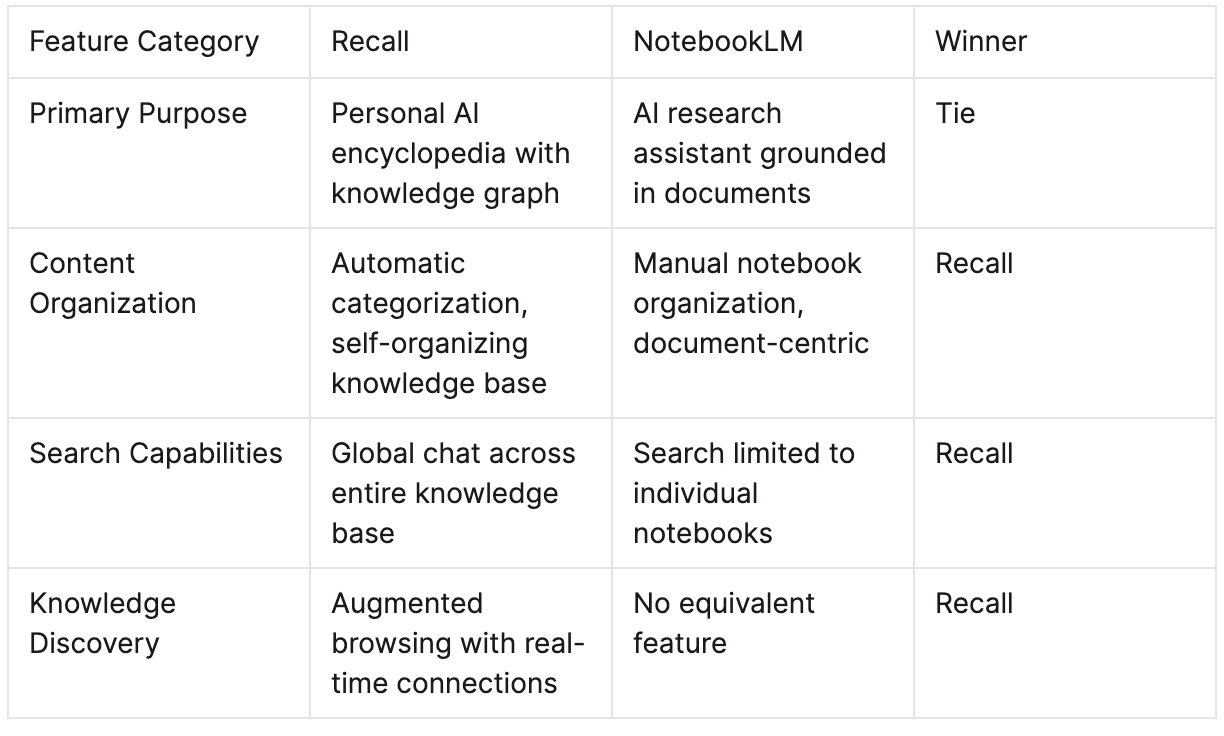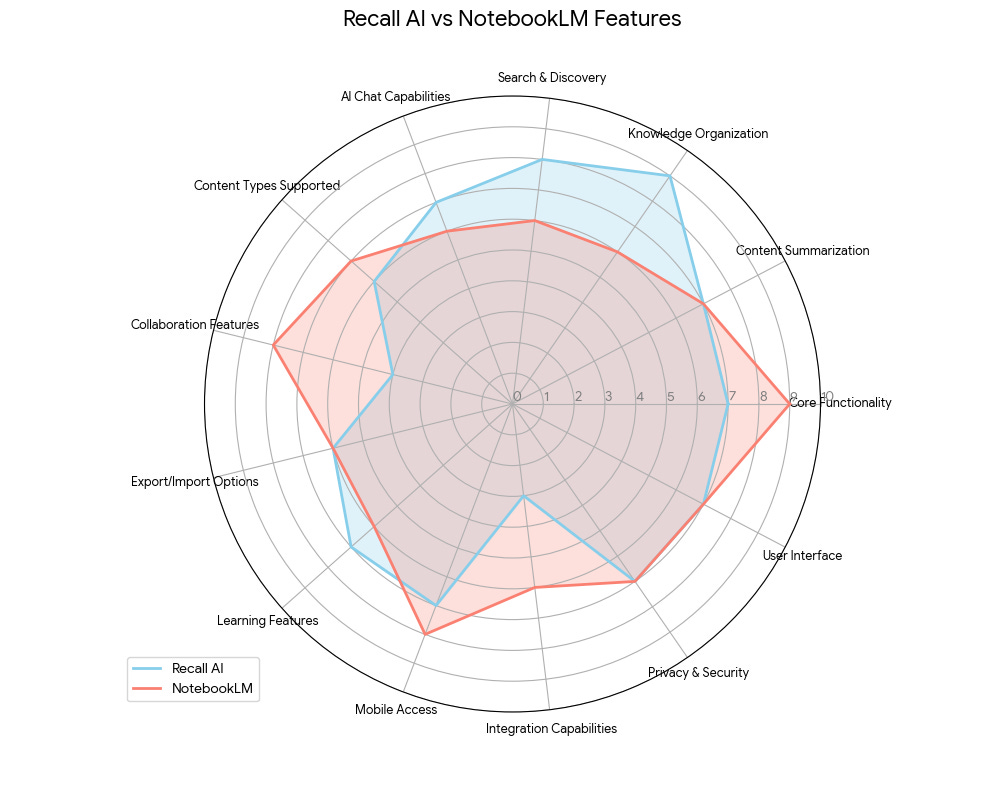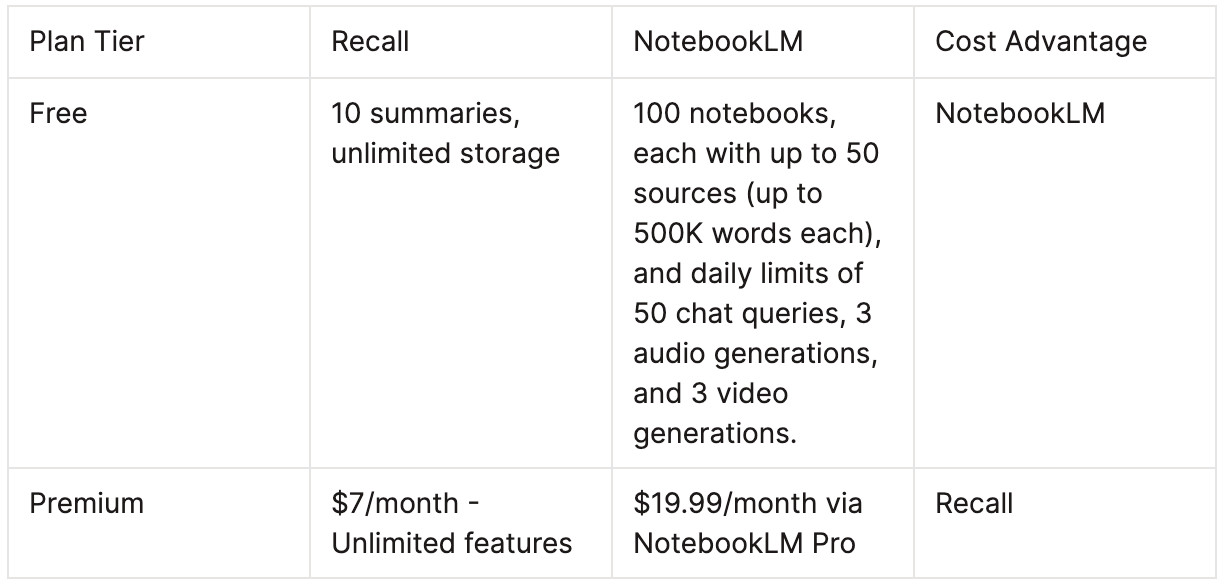Recall AI vs Google NotebookLM
Both Recall and Google NotebookLM represent powerful but different approaches to AI-powered research and knowledge management.
Both Recall and Google NotebookLM represent powerful but different approaches to AI-powered research and knowledge management. Recall excels as a personal knowledge base with great organization and discovery(of related content) capabilities, while NotebookLM serves as a deep research tool with strong collaboration and enterprise features.
Features
Core Functionality Comparison
Content Types and Integration
Recall supports YouTube videos, PDFs, articles, podcasts, webpages, recipes, and movies with seamless browser extension integration. The platform's strength lies in its ability to automatically summarize, categorize and connect diverse content types with AI and through its knowledge graph architecture.
NotebookLM handles PDFs, Google Docs, Web URLs, YouTube videos, and audio files with deep Google Workspace integration. It excels in document analysis and can process up to 50 sources per notebook, with Pro versions supporting higher limits.
AI Capabilities and Learning Features
Feature Comparison
Recall AI vs NotebookLM across Key Categories (0 - 10 scale rating)
Learning Features
Recall implements advanced learning methodologies including spaced repetition, active recall, and AI-generated quizzes designed to enhance long-term knowledge retention. The platform's knowledge graph automatically links related concepts, uncovering hidden connections users might miss.
NotebookLM focuses on data analysis, generating study guides, FAQs, timelines, and innovative audio overviews that transform complex documents into podcast-style discussions. Its strength lies in source-grounded responses with proper citations.
Cost Analysis
It's easy to see that NotebookLMs free version is way cheaper than the cost of Recall or NotebookLM Pro. If the core functionality of Recall is not what you're looking for then stick with NotebookLM and only upgrade when you hit the limits of that tier or need the added enterprise grade features.
Strengths and Limitations
Recall Advantages
Strengths:
Superior knowledge organization through automatic categorization and knowledge graphs
Augmented browsing provides real-time knowledge connections while browsing
Advanced learning features with spaced repetition and active recall methodologies
Limitations:
Getting data into Recall is cumbersome and tedious for project based research. Source data must be added one at a time in the current version but bulk actions are in the roadmap.
Limited collaboration features - primarily designed for individual use
Smaller ecosystem compared to Google's platform integration
NotebookLM Advantages
Strengths:
Collaboration capabilities with shared notebooks
Google Workspace integration for seamless workflow
Enterprise-grade security with VPC-SC compliance
Innovative audio overviews transform documents into listenable content
Limitations:
Siloed approach - search and chat limited to individual notebooks
Manual organization required - lacks automatic categorization
No knowledge graph functionality for discovering connections
Final Thoughts
If your workflow is import-heavy and you don’t mind project-by-project silos, NotebookLM runs ahead. But if you want long-term aggregation—tag-based context, flexible project management, and data repurposing—Recall's knowledge base is more scalable.
In the end, neither is objectively better than the other based on the final results you get. For long-term synthesis and connecting patterns across datasets, Recall fit my workflow best. For focused, topic-specific reports—or if I want to get up and running quickly—Notebook LM is more efficient. Neither will magically solve the research problem for you, but the right tool makes all the difference depending on what you want out of your data.
Note: This report has been prepared using the most accurate and reliable information available at the time of writing. However, some details may be subject to change, interpretation, or unintentional error. Readers are encouraged to verify critical information independently, as the author cannot guarantee complete accuracy in every instance.




